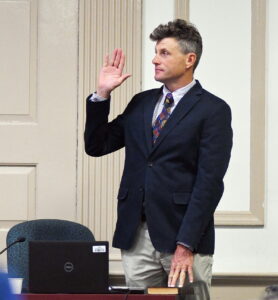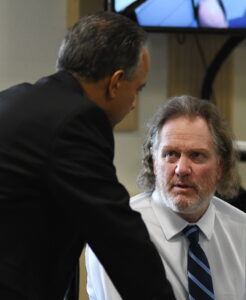An increasingly panicked and desperate Michael Barisone was trying to get help as his life was spinning out of control, a psychiatrist testified today in the dressage trainer’s trial on attempted murder and weapon charges.
The expert witness, Dr. Steven Simring, concluded Barisone suffered not only from delusional disorder but also was dealing with persistent depressive disorder, noting he had been seeing a therapist for years.

Dr. Steven Simring holds up a report given to him by Michael Barisone, part of his stack of papers that includes police reports and Facebook postings. (Photo © 2022 by Nancy Jaffer)
Barisone, the 2008 U.S. Olympic Dressage Team alternate, is charged with shooting his student, Lauren Kanarek, who was a tenant in his farmhouse with her boyfriend, Robert Goodwin. He was trying to get them to leave his Hawthorne Hill farm in Washington Township, N.J.’s Long Valley section, and obsessed over Kanarek’s social media postings. He believed she was destroying his life and planned to kill him.
That fear changed him from “a remarkable guy” and “a fantastic horseman,” as Olympic eventer Boyd Martin put it, to a deeply troubled shadow of himself,.
Martin took the stand before Judge Stephen Taylor in Superior Court, Morristown, N.J., to testify about how Barisone was viewed in the equestrian community.
“He was one of those people you are drawn to, larger than life,” said Martin. He recalled how Barisone was so dedicated he would leave New Jersey before dawn to get to Martin’s Windurra Farm in Pennsylvania, arriving before the eventer was even out of bed in order to get ready to train him.
As happened yesterday when fellow eventer Phillip Dutton testified, the subject of a barn fire at a stable Martin was renting in 2011 came up. Six horses died in the blaze, caused by a faulty hay steamer.
Defense attorney Chris Deininger asked Martin, if had he been at the barn that night and noticed the machine was faulty, “would you have done something to address it?”
Martin was not allowed to answer after the prosecution objected. The question related to Robert Goodwin’s agitation about a dryer that wouldn’t turn off in Barisone’s stable in 2019. Outside court, several people mentioned they had wondered why Goodwin just didn’t unplug the dryer if he was upset about it.
Most of the morning was taken up with testimony by Simring. Under questioning by lead defense attorney Edward Bilinkas, the doctor noted, “Mr. Barisone was trying everything within his power to stop the relationship between him, Kanarek and Goodwin. He wanted them off his property. They didn’t want to leave. They claim they had a right to be there.
“Mr. Barisone said he was scared to death of Lauren Kanarek.”
The trainer “became increasingly desperate, because he saw himself in a situation in which he was being physically threated by Lauren Kanarek and Robert Goodwin. He felt trapped. He felt there was no way out. He was afraid he’d be killed and wanted to defend himself.”
He noted that Barisone also was upset about having his conversations recorded after he found things he had said privately being quoted on Facebook. He hired a company to sweep his property to find the bugs.
The psychiatrist sat behind an eight-inch-high stack of papers, which included 19,000 of Kanarek’s Facebook posts that had intimidated Barisone, as well as various police reports and other items relating to the case, including a 91-page report assembled by his patient.
Simring spoke with therapist Ann Picardo, whom Barisone had seen for 20 years when she treated him for depression and anxiety.
“I learned from her he came from a family which was emotionally and physically abusive. One of the maternal grandparents suffered from depression,” said Simring, noting he believed that person had required shock treatment.
“Depression runs in families,” said Simring, noting Picardo described Barisone as “very troubled” and “thought he was at considerable risk for suicide,” even before the incident. He told the therapist that he “had lost everything.”
Simring commented that as Barisone’s disturbance grew, “everyone noticed he was no longer the same person.”
While Barisone remembered what had led up to the shooting and what happened afterward, he couldn’t remember the incident itself, Simring said.
“One of the things seemed to be that Robert Goodwin hit him on the head with a cellphone and that is probably the most likely reason he lost memory,” the psychiatrist said, commenting that Barisone suffered a hematoma behind his ear and other injuries.
Dr. Charles Hasson, a psychologist, also testified today, noting Barisone was emotionally unstable and had researched getting assisted suicide in Switzerland in 2015.
Hasson had Barisone do a battery of tests, which showed among other things he scored very high in paranoia and anxiety. He was “very prone to making idiosyncratic deductions,” combining them “in a way that doesn’t make sense.”
He noted that over the years, Barisone had eight to 12 concussions and a skull fracture. People who ride often suffer concussions when they fall off.
Noting how frightened he was of Kanarek and Goodwin, Hasson quoted Barisone as saying, “these are dangerous people” and worried about the fate of the horses at his farm and the children of his then-girlfriend, Mary Haskens Gray, if something happened to him.
The day ended with Morris County Supervising Assistant Prosecutor Chris Schellhorn doing a back-and-forth with Hasson about the validity of his testing process and mentioning that “feigned amnesia is found more frequently in individuals with legal problems.”


